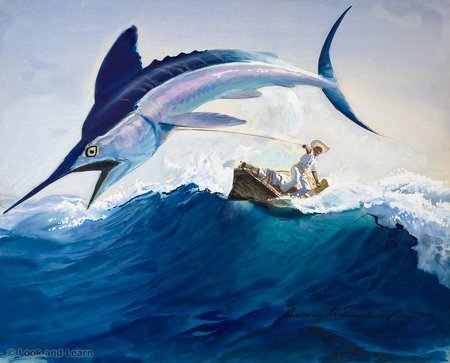SANTIAGO: The protagonist of the work, appears
us as an old thin and clumsy fisherman, with deep wrinkles and skin burned by
the Sun. In spite of his oldness, it us appears as a strong and brave man though
he feels alone and his only company is that of a boy to the one that taught the
trade of the fishing. This feeling of loneliness accents when he is out to sea
in his boat, since it alludes constant to his nostalgia of the boy and, for
this reason, though he thinks that they can consider it madman, talks with it
itself. He is an austere and humble man, who is marked by the bad luck, since
it goes 84 days without fishing any fish and survives thanks to the help of the
boy, who provides food and fodder to him to go fishing.
MANOLIN: He is the young person who already from small accompanies Santiago in his days of fishing to learn the trade. Nevertheless, after forty days without the old man was taking no fish, his parents decide that it should go out to work in another more productive boat. In spite of it, he continues visiting Santiago every day and, since he feels worried by the almost precarious situation, for which his friend is happening, provides food to him, towels and water in order that it tidies up itself and it comes to visit it to speak on baseball or adventures that Santiago lived in Africa during his youth. The boy also misses to work with Santiago and promises to accompany him at some time. It is he who helps the old man initially with the statement and who watches it ultimately; she is the only person who worries for him.
THE SEA: As its title suggests, the sea is a central character in the novel. Most of the story takes place on the sea, and Santiago is constantly identified with it and its creatures; his sea-colored eyes reflect both the sea's tranquility and power, and its inhabitants are his brothers. Santiago refers to the sea as a woman, maybe as his mother, and the sea seems to represent the feminine complement to Santiago's masculinity. The sea might also be seen as the unconscious from which creative ideas are drawn.
MANOLIN: He is the young person who already from small accompanies Santiago in his days of fishing to learn the trade. Nevertheless, after forty days without the old man was taking no fish, his parents decide that it should go out to work in another more productive boat. In spite of it, he continues visiting Santiago every day and, since he feels worried by the almost precarious situation, for which his friend is happening, provides food to him, towels and water in order that it tidies up itself and it comes to visit it to speak on baseball or adventures that Santiago lived in Africa during his youth. The boy also misses to work with Santiago and promises to accompany him at some time. It is he who helps the old man initially with the statement and who watches it ultimately; she is the only person who worries for him.
THE SEA: As its title suggests, the sea is a central character in the novel. Most of the story takes place on the sea, and Santiago is constantly identified with it and its creatures; his sea-colored eyes reflect both the sea's tranquility and power, and its inhabitants are his brothers. Santiago refers to the sea as a woman, maybe as his mother, and the sea seems to represent the feminine complement to Santiago's masculinity. The sea might also be seen as the unconscious from which creative ideas are drawn.
THE MARLIN: He is an eighteen-foot fish weighing more than a
thousand pounds, the largest ever caught in the Gulf Stream. He can be considered to be one
more personage, so it’s personified, in certain way, by Santiago when he speaks
with him. Everything begins as a normal day in the routine of the old man,
except that it goes eighty four days without fishing a fish, and for him the
number of the luck is eighty five, for what he trusts that this squall of bad
luck was finishing this day. In effect, after a few hours it notices that
something stings in the fodder; from this moment a fight develops, slow,
reflexive and slow, that lasted days until it can kill to the fish. Throughout
this time, Santiago imagines which can be the movements of the fish and speech
with him, treating it always as brother, speaking about his nobility and
dignity, and even asking for pardon him for fishing it and to kill it.



No hay comentarios.:
Publicar un comentario